【2020年】2020年外研版高中英语必修四(全套)练习汇总
- 格式:doc
- 大小:3.08 MB
- 文档页数:131
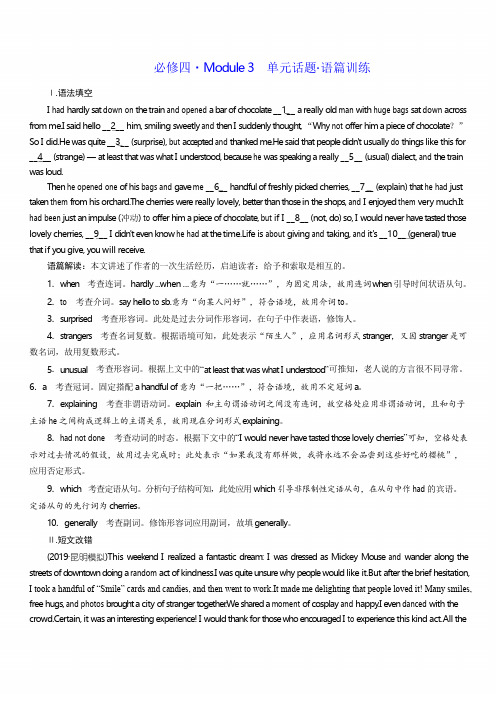
必修四·Module3单元话题·语篇训练Ⅰ.语法填空I had hardly sat down on the train and opened a b ar of chocolate__1__a really old man with huge bags sat down across from me.I said hello__2__him,smiling sweetly and then I suddenly thought,“Why not offer him a piece of chocolate?”So I did.He was quite__3__(surprise),but accepted and thank ed me.He said that people didn't usually do things like this for __4__(strange)—at least that was what I understood,because he was speaking a really__5__(usual)dialect,and the train was loud.Then he opened one of his bags and gave me__6__handful of freshly picked cherries,__7__(explain)that he had just tak en them from his orchard.The cherries were really lovely,better than those in the shops,and I enjoyed them very much.It had been just an impulse(冲动)to offer him a piece of chocolate,but if I__8__(not,do)so,I would never have tasted those lovely cherries,__9__I didn't even know he had at the time.Life is about giving and taking,and it's__10__(general)true that if you give,you will receive.语篇解读:本文讲述了作者的一次生活经历,启迪读者:给予和索取是相互的。
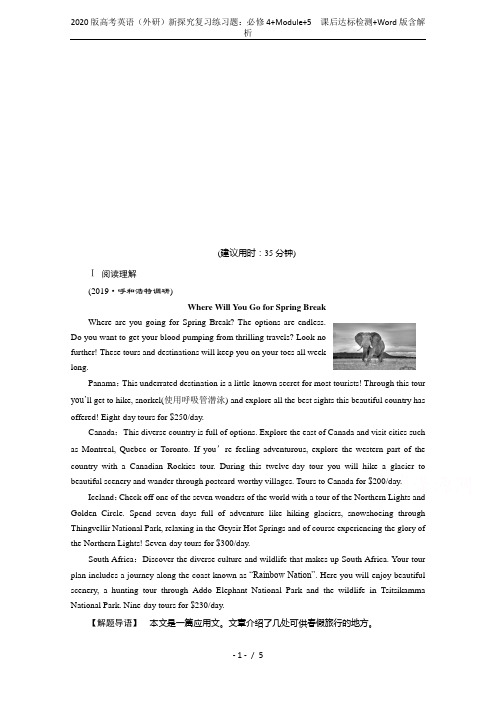
(建议用时:35分钟)Ⅰ阅读理解(2019·呼和浩特调研)Where Will You Go for Spring BreakWhere are you going for Spring Break? The options are endless.Do you want to get your blood pumping from thrilling travels? Look nofurther! These tours and destinations will keep you on your toes all weeklong.Panama:This underrated destination is a little-known secret for most tourists! Through this tour you’ll get to hike, snorkel(使用呼吸管潜泳) and explore all the best sights this beautiful country has offered! Eight-day tours for $250/day.Canada:This diverse country is full of options. Explore the east of Canada and visit cities such as Montreal, Quebec or Toronto. If you’re feeling adventurous, explore the western part of the country with a Canadian Rockies tour. During this twelve-day tour you will hike a glacier to beautiful scenery and wander through postcard-worthy villages. Tours to Canada for $200/day.Iceland:Check off one of the seven wonders of the world with a tour of the Northern Lights and Golden Circle. Spend seven days full of adventure like hiking glaciers, snowshoeing through Thingvellir National Park, relaxing in the Geysir Hot Springs and of course experiencing the glory of the Northern Lights! Seven-day tours for $300/day.South Africa:Discover the diverse culture and wildlife that makes up South Africa. Your tour plan includes a journey along the coast known as “Rainbow Nation”. Here you will enjoy beautiful scenery, a hunting tour through Addo Elephant National Park and the wildlife in Tsitsikamma National Park. Nine-day tours for $230/day.【解题导语】本文是一篇应用文。
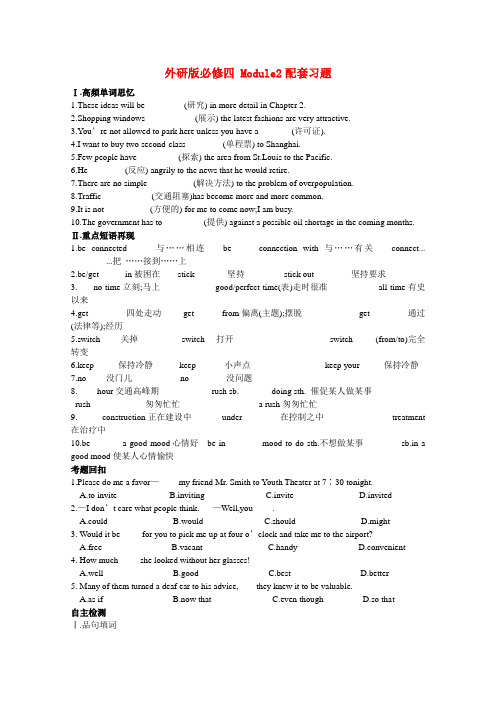
外研版必修四 Module2配套习题Ⅰ.高频单词思忆1.These ideas will be ________ (研究) in more detail in Chapter2.2.Shopping windows ___________(展示) the latest fashions are very attractive.3.You’re not allowed to park here unless you have a _______(许可证).4.I want to buy two second-class ________(单程票) to Shanghai.5.Few people have _________(探索) the area from St.Louis to the Pacific.6.He ________(反应) angrily to the news that he would retire.7.There are no simple __________(解决方法) to the problem of overpopulation.8.Traffic ___________(交通阻塞)has become more and more common.9.It is not __________(方便的) for me to come now;I am busy.10.The government has to _________(提供) against a possible oil shortage in the coming months. Ⅱ.重点短语再现1.be connected _____与……相连be_____ connection with与……有关connect... ________...把……接到……上2.be/get _____ in被困在stick _______坚持stick out ________坚持要求3.___ no time立刻;马上______ good/perfect time(表)走时很准___ all time有史以来4.get _______ 四处走动get _____ from偏离(主题);摆脱get ________通过(法律等);经历5.switch ___ 关掉switch __打开switch ____ (from/to)完全转变6.keep _____保持冷静keep ______小声点keep your _____保持冷静7.no ____没门儿no ________没问题8.____ hour交通高峰期rush sb._______ doing sth. 催促某人做某事rush ____________匆匆忙忙_________ a rush匆匆忙忙9._____ construction正在建设中under _______ 在控制之中______ treatment 在治疗中10.be ______ a good mood心情好be in _______ mood to do sth.不想做某事____ sb.in a good mood使某人心情愉快考题回扣1.Please do me a favor—____ my friend Mr. Smith to Youth Theater at 7∶30 tonight.A.to inviteB.invitingC.inviteD.invited2.—I don’t care what people think. —Well,you ____.A.couldB.wouldC.shouldD.might3. Would it be ____ for you to pick me up at four o’clock and take me to the airport?A.freeB.vacantC.handyD.convenient4. How much ____ she looked without her glasses!A.wellB.goodC.bestD.better5. Many of them turned a deaf ear to his advice,____they knew it to be valuable.A.as ifB.now thatC.even thoughD.so that自主检测Ⅰ.品句填词1.Can you give me some simple _________(方法) to this problem?2.We don’t _______(容许) smoking in the office.3.The sick person _______(反应) badly to this medicine and died at last.4.The 11th National Game held in Jinan was a great success, which made a strong __________ (印象) on the whole country.5.The new freeway is under ____________(建造) which leads to Henan Province.6.They were marching forward despite the heavy rain because they had to reach the ___________ (目的地) before dark.7.After the accident, the driver drove his car away. Fortunately, video cameras recorded his _____________ (牌照) number.8.In the gallery his painting will be _________ (展示) to the public.9.Is it ___________ (方便的) for you to spare me several minutes?10.You’d better keep all your ________(收据) for work-related expenses.Ⅱ.短语运用2.Thoughts can be expressed ___________ music.3.Hurry up!We’ll set out ___________ .4.The rumor that the leader was murdered ___________ soon.5.A 15,000metre long bridge is ______ _____________ over the sea in Qingdao.6.We’ll be home ____________.7.Will it _________________ you to start work tomorrow?8.The line ________________ that wire tied to the wall.9.Don’t forget to ___________ the tap when you’ve finished washing your hands.10.When facing such kind of things, you should ___________.You know,calming yourself is good. Ⅲ.翻译句子1.你方便的话,请在下午6点钟来。
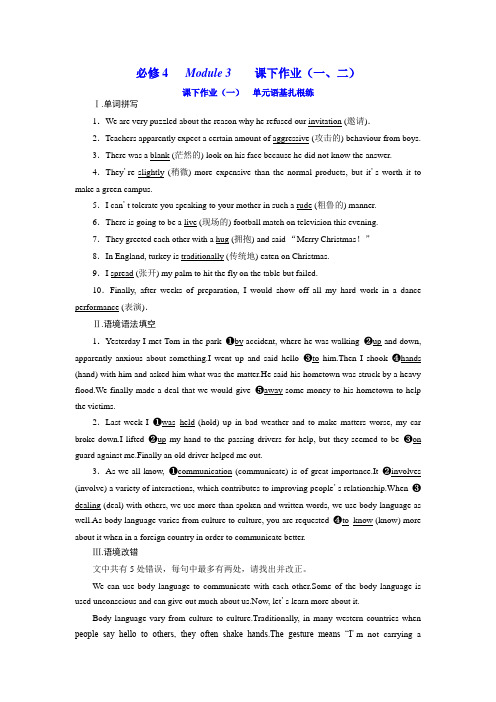
必修4 Module 3 课下作业(一、二)课下作业(一)单元语基扎根练Ⅰ.单词拼写1.We are very puzzled about the reason why he refused our invitation (邀请).2.Teachers apparently expect a certain amount of aggressive (攻击的) behaviour from boys.3.There was a blank (茫然的) look on his face because he did not know the answer.4.They're slightly (稍微) more expensive than the normal products, but it's worth it to make a green campus.5.I can't tolerate you speaking to your mother in such a rude (粗鲁的) manner.6.There is going to be a live (现场的) football match on television this evening.7.They greeted each other with a hug (拥抱) and said “Merry Christmas!”8.In England, turkey is traditionally (传统地) eaten on Christmas.9.I spread (张开) my palm to hit the fly on the table but failed.10.Finally, after weeks of preparation, I would show off all my hard work in a dance performance (表演).Ⅱ.语境语法填空1.Yesterday I met Tom in the park ❶by accident, where he was walking ❷up and down, apparently anxious about something.I went up and said hello ❸to him.Then I shook ❹hands (hand) with him and asked him what was the matter.He said his hometown was struck by a heavy flood.We finally made a deal that we would give ❺away some money to his hometown to help the victims.2.Last week I ❶was_held (hold) up in bad weather and to make matters worse, my car broke down.I lifted ❷up my hand to the passing drivers for help, but they seemed to be ❸on guard against me.Finally an old driver helped me out.3.As we all know, ❶communication (communicate) is of great importance.It ❷involves (involve) a variety of interactions, which contributes to improving people's relationship.When ❸dealing (deal) with others, we use more than spoken and written words, we use body language as well.As body language varies from culture to culture, you are requested ❹to_know (know) more about it when in a foreign country in order to communicate better.Ⅲ.语境改错文中共有5处错误,每句中最多有两处,请找出并改正。
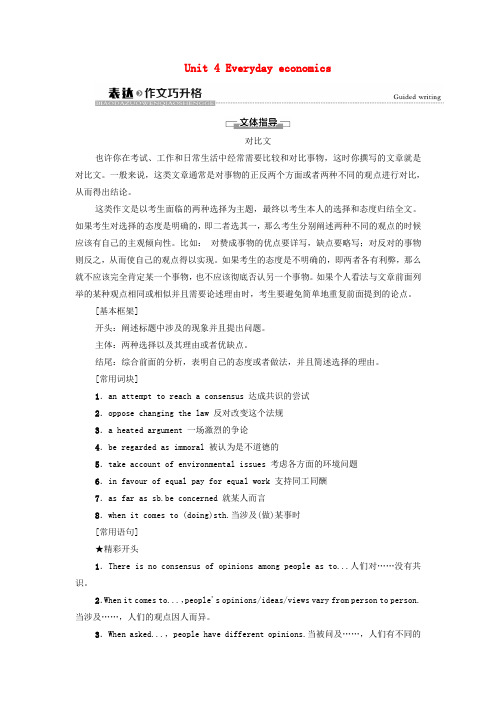
Unit 4 Everyday economics对比文也许你在考试、工作和日常生活中经常需要比较和对比事物,这时你撰写的文章就是对比文。
一般来说,这类文章通常是对事物的正反两个方面或者两种不同的观点进行对比,从而得出结论。
这类作文是以考生面临的两种选择为主题,最终以考生本人的选择和态度归结全文。
如果考生对选择的态度是明确的,即二者选其一,那么考生分别阐述两种不同的观点的时候应该有自己的主观倾向性。
比如:对赞成事物的优点要详写,缺点要略写;对反对的事物则反之,从而使自己的观点得以实现。
如果考生的态度是不明确的,即两者各有利弊,那么就不应该完全肯定某一个事物,也不应该彻底否认另一个事物。
如果个人看法与文章前面列举的某种观点相同或相似并且需要论述理由时,考生要避免简单地重复前面提到的论点。
[基本框架]开头:阐述标题中涉及的现象并且提出问题。
主体:两种选择以及其理由或者优缺点。
结尾:综合前面的分析,表明自己的态度或者做法,并且简述选择的理由。
[常用词块]1.an attempt to reach a consensus 达成共识的尝试2.oppose changing the law 反对改变这个法规3.a heated argument 一场激烈的争论4.be regarded as immoral 被认为是不道德的5.take account of environmental issues 考虑各方面的环境问题6.in favour of equal pay for equal work 支持同工同酬7.as far as sb.be concerned 就某人而言8.when it comes to (doing)sth.当涉及(做)某事时[常用语句]★精彩开头1.There is no consensus of opinions among people as to...人们对……没有共识。
2.When it comes to...,people's opinions/ideas/views vary from person to person.当涉及……,人们的观点因人而异。
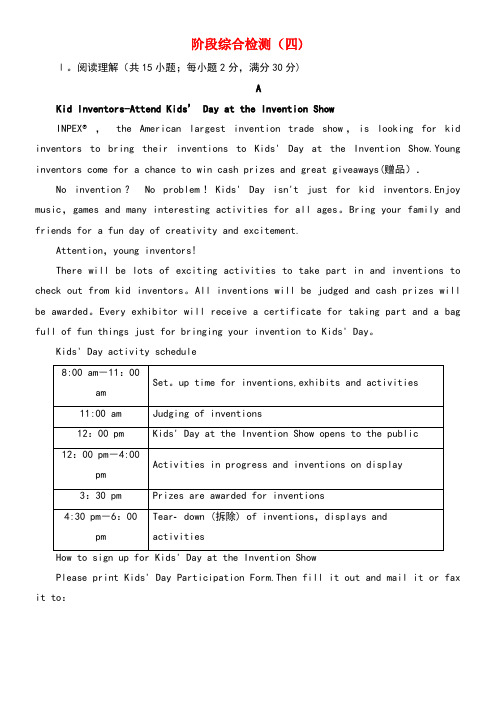
阶段综合检测(四)Ⅰ。
阅读理解(共15小题;每小题2分,满分30分)AKid Inventors-Attend Kids’ Day at the Invention ShowINPEX®,the American largest invention trade show,is looking for kid inventors to bring their inventions to Kids' Day at the Invention Show.Young inventors come for a chance to win cash prizes and great giveaways(赠品).No invention?No problem!Kids' Day isn't just for kid inventors.Enjoy music,games and many interesting activities for all ages。
Bring your family and friends for a fun day of creativity and excitement.Attention,young inventors!There will be lots of exciting activities to take part in and inventions to check out from kid inventors。
All inventions will be judged and cash prizes will be awarded。
Every exhibitor will receive a certificate for taking part and a bag full of fun things just for bringing your invention to Kids' Day。
必修4 Module 4 课下作业(一、二)课下作业(一)单元语基扎根练Ⅰ.单词拼写1.Just as I was wondering what to do next, I saw a familiar figure (人物) passing by our classroom.2.The city council is taking steps to replace (取代) its street cars with buses.3.Surgeons have made a great breakthrough (突破) in the kidney transplantation.4.He published (出版) his first novel when he was eighteen years old.5.Use a small cushion to help give support (支撑) to the lower back.6.He let out a long sigh, mainly of relief, partly (部分地) of sadness.7.On a clear (晴朗的) day you can see the coast.8.We've always placed quality before quantity (数量).Ⅱ.语境语法填空1.Wang Gang was born and brought ❶up in a remote mountain village, where people mainly earned ❷their living by farming.❸As a result of lacking advanced farming technique, they lived a hard life.After new farming technique was brought ❹in,_their life was getting better and better.2.Mrs Green ❶was_diagnosed (diagnose) with breast cancer, and went to a doctor who was known ❷for treating cancers.The doctor carried ❸out a series of treatments on her, and told her that the key to ❹recovering (recover) rapidly was to have a relaxed mind.Following the doctor's advice, she gradually picked up.3.❶It is clear to everyone that nothing can replace mother's love and care.His mother, who earned her living by selling newspapers, spent a large quantity of money on his ❷education (educate).He became ❸an outstanding figure in his field soon after his ❹graduation (graduate).His first book ❺was_published (publish) last week. ❻In brief, it was his mother's support that contributed to his success.Ⅲ.语境改错文中共有5处错误,每句中最多有两处,请找出并改正。
姓名,年级:时间:必修四Module 2 Traffic Jam语境运用语境词汇运用▶词汇拼写(注意单词或短语的形式变化)1。
She wants her paintings (展出)in the gallery, but we don’t think they would be very popular.2。
Is it the price that you see on the gift (收据) that makes a gift special?3。
Body language can give away a lot about your (心情). 4.We intend to go to India, even if air (费) will go up again between now and next summer。
5。
I want two (返程票)to Edinburgh, please。
6。
After a long time, they finally arrived at the d 。
7。
Many Chinese universities p scholarships for students in need of financial aid.8。
Scientists have discovered that bees learn to fly the shortest possible r between flowers。
9.Health problems are closely c with bad eating habits anda lack of exercise。
10。
She got s in a traffic jam on the way, or she would be having dinner with us now.答案1。
displayed 2。
receipt 3.mood 4.fares 5.returns 6。
课时作业六1.— Could you do me a favor?— It depends on it is. (06北京29)A.whichB.whicheverC.whatD.whatever2.What we used to think impossible now does seem possible. (06天津4)A.isB.wasC.has beenD.will be3. team wins on Saturday will go through to the national championships. (06山东27)A.No matter whatB.No matter whichC.WhateverD.Whichever4.A warm thought suddenly came to me I might use the pocket money to buy some flowers for my mother’s birthday. (06安徽29)A.ifB.whenC.thatD.which5. —It’s thirty years since we last met.—But I still remember the story,believe it or not, we got lost on a rainy night. (06四川30)A.whichB.thatC.whatD.when6.See the flags on top of the building? That was we did this morning. (06全国Ⅰ23)A.whenB.whichC.whereD.what7.—What did your parents think about your decision?—They always let me do I think I should. (06全国Ⅱ16)A.whenB.thatC.howD.what8. makes this shop different is that it offers more personal services.(06辽宁30)A.WhatB.WhoC.WhateverD.Whoever9. —Shall we go to the concert? —We can’t. ____, it’s too cold. Besides, we’ve no money.A. For a startB. In other wordsC. On the other handD. As a result10. —_____! There is danger ahead. —Thanks for the warning.A. Look upB. Look roundC. Look outD. Look after11. He does not pay attention to anybody. You are ______ your time in persuading him.A. spendingB. wastingC. losingD. missing12. —Could you _____ the bad habit of smoking?—I’ll try my best.A. get rid ofB. get down toC. get offD. get out13. Mr. and Mrs. Smith are going to Brazil next week, and they ___ in Mexico later in the month.A. have traveledB. traveledC. will be travelingD. travel14. — Can I help you, sir?—I’d like a sandwich and a cold cola. How much do you _____?A. offerB. chargeC. affordD. spend15. You must _____ your fear and worry if you want to take up bungee as your hobby.A. get rid ofB. put up withC. get used toD. come up with16. When ____, the bridge linking southern Guangdong province with Hong Kong and Macao will be the world’s longest sea-crossing bridge.A. to be completedB. being completedC. completingD. completed17. I can’t thank you ______ much for your kindness, because without your help I can’t have succeeded in the exam.A. tooB. veryC. quiteD. that18. People’s political beliefs are often _____ by what they read in newspapers.A. producedB. shapedC. madeD. took19. At this time tomorrow ____over the Atlantic.A. we’re going to flyB. we’ll be flyingC. we’ll flyD. we’re to fly20.—I’ll come to attend your lecture at 10:00 to morrow.—I’m sorry, but by then my lecture will have ended and I____my guests in my office.A. being metB. will meetC. will be meetingD. will have met21. The train____at the present speed until it reaches the foot of mountain at 9.A. wentB. is goingC. goesD. will be going22. —I will call at your house at 7 this evening.—Sorry, but I____a very important meeting at that time.A. am havingB. has hadC. haveD. will be having23. Look at the clouds. ____ .A. It'll rainB. It's going to rainC. It'll be rainingD. It is to rainDRunners in a relay (接力) race pass a stick in one direction. However, merchants passed silk, gold, fruit, and glass along the Silk Road in more than one direction. They earned their living by traveling the famous Silk Road.The Silk Road was not a simple trading network. It passed through thousands of cities and towns. It started from eastern China, across Central Asia and the Middle East, and ended in the Mediterranean Sea. It was used from about 200 B. C. to about A. D. 1300, when sea travel offered new routes (路线), It was sometimes called the world’s longest highway. However, the Silk Road was made up of many routes, not one smooth path. They passed through what are now 18 countries. The routes crossed mountains and deserts and had many dangers of hot sun, deep snow and even battles. Only experienced traders could return safe.The Silk Road got its name from its most prized product. Silk could be used like money to pay taxes or buy goods. But the traders carried more than just silk. Gold, silver, and glass from Europe were much found in the Middle East and Asia. Horses traded from other areas changed farming practices in China. Indian merchants traded salt and other valuable goods. Chinese merchants traded paper, which produced an immediate effect on the West. Apples traveled from central Asia to Rome. The Chinese had learned to graft (嫁接) different trees together to make new kinds of fruit. They passed this science on to others, including the Romans. The Romans used grafting to grow the apple. Trading along the Silk Road led to world-wide business 2,000 years before the World Wide Web. The people along the Silk Road did not share just goods. They also shared their beliefs. The Silk Road provided pathways for learning, diplomacy (外交), and religion (宗教).53. It’s probable that traders along the Silk Road needed ________ .A. to remember the entire trade routeB. to know the making of productsC. to receive certain special trainingD. to deal with a lot of difficulties54. The Silk Road became less important because __________ .A. it was made up of different routesB. silk trading became less popularC. sea travel provided easier routesD. people needed fewer foreign goods55. New technologies could travel along the Silk Road because people __________ .A. learned from one anotherB. shared each other’s beliefsC. traded goods along the routeD. earned their living by traveling56. What is the best title for the passage?A. The Silk Road: Past and PresentB. The Silk Road: East Meets WestC. The Silk Road: Routes Full of DangersD. The Silk Road: Pathways for Learning阅读下面短文,在空白处填入 1个适当的单词或括号内单词的正确形式。
【推荐】2020年外研版高中英语必修四(全套)练习汇总
Module 1-3 Grammar(语法篇) Ⅰ.单句语法填空 1.Don't call me up at 10 o'clock in the evening. I________(sleep) then. 2.After you take the medicine, you__________(feel) much better. 3.At 9 o'clock tonight I__________(do) my homework at home. 4.At this time next year, I hope I__________(study) in this university. 5.When you arrive there, I__________(play) football. You can join us. 6.Daniel's family__________(enjoy) their holiday in Beijing at this time next week. 7.I__________(take) an exam at 2∶30 tomorrow afternoon, so I can't go skating with you. 8.I feel so excited! At this time tomorrow morning I__________(fly) to Shanghai. 9.Tom__________(speak) at the meeting at 3 o'clock tomorrow afternoon because he is the chairman of the meeting. 10.I'm afraid I won't be available.I__________(see) a friend off at 3 o'clock tomorrow afternoon. 11.The wet weather__________(continue) tomorrow, when a cold front is expected to arrive. 12.—If I come back in an hour, do you think the manager will see me? —I'm very sorry, sir, but he__________(have) a meeting then. 13.—What are you doing, Jack? —I'm making a model plane.I__________(show) it in the science class at 10 o'clock tomorrow morning. 14.—What will you do tomorrow evening? —I__________(watch) my favourite program at 8 o'clock tomorrow evening. 15.—I'm going to attend your lecture at 9∶30 tomorrow morning. —I regret to tell you that when you arrive, it will have ended and I__________(discuss) questions with my students.
答案 1.will/shall be sleeping 2.will feel 3.will/shall be doing 4.will/shall be studying 5.will/shall be playing 6.will be enjoying 7.will/shall be taking 8.will/shall be flying 9.will be speaking 10.will/shall be seeing 11.will continue 12.will be having 13.will/shall be showing 14.will/shall be watching 15.will/shall be discussing Ⅱ.阅读理解 A Many people believe that you lose the ability to learn new languages as you get older. Language experts, however, will tell you that you're never too old to learn a new language. As you get older, it can be more difficult to learn a new language, though. Children and adults learn new languages in different ways. For children, language is their life. They study for thousands of hours every year, because they need to learn languages to become part of their communities. Adults, on the other hand, are already part of a language community. Learning a new language means becoming part of another language community, and adults rarely get the chance to practice as much as young children do. Moreover, children learning a new language are expected to make mistakes. This gives them freedom when learning to be daring and confident. Adults, however, often feel pressured to be perfect when learning a new language. This can discourage many people and make it even harder to learn a new language. When young children learn a new language, they come to see various languages as a “normal” part of society. This mindset (思维模式)helps them embrace learning a new language without feeling like they're doing something unusual or “too hard”. So if you want to learn a new language, go for it! It's never too late to learn a new language. If you're older, it may take more work, but it can be done. If you're a young child, though, now is the time to step out and learn a new language! 1. By “Language is their life”, the author means that children________. A.can't live without language B. lead a happy life every day C.practice a new language a lot D. are taken good care of adults 2. What may make it hard for the old people to learn to a new language? A.They are afraid of being laughed at. B. They usually have too many interests. C.They think making mistakes is natural. D. They always make all kinds of mistakes. 3. Which of the following shows the difference between children and adults in learning a new language? A.The behaviors they have. B. The learning attitudes. C.The future plans they have made. D. The materials they are using. 4. According to the author, a new language________. A.can never be learned by the old people B. can be grasped by the old people easily C. can be understood only by the old people D. can be learned by both the old and the young 答案与解析